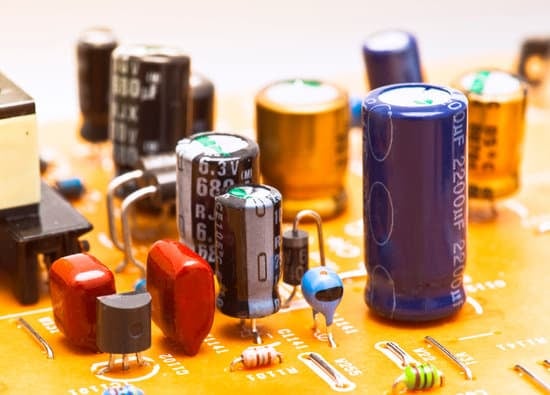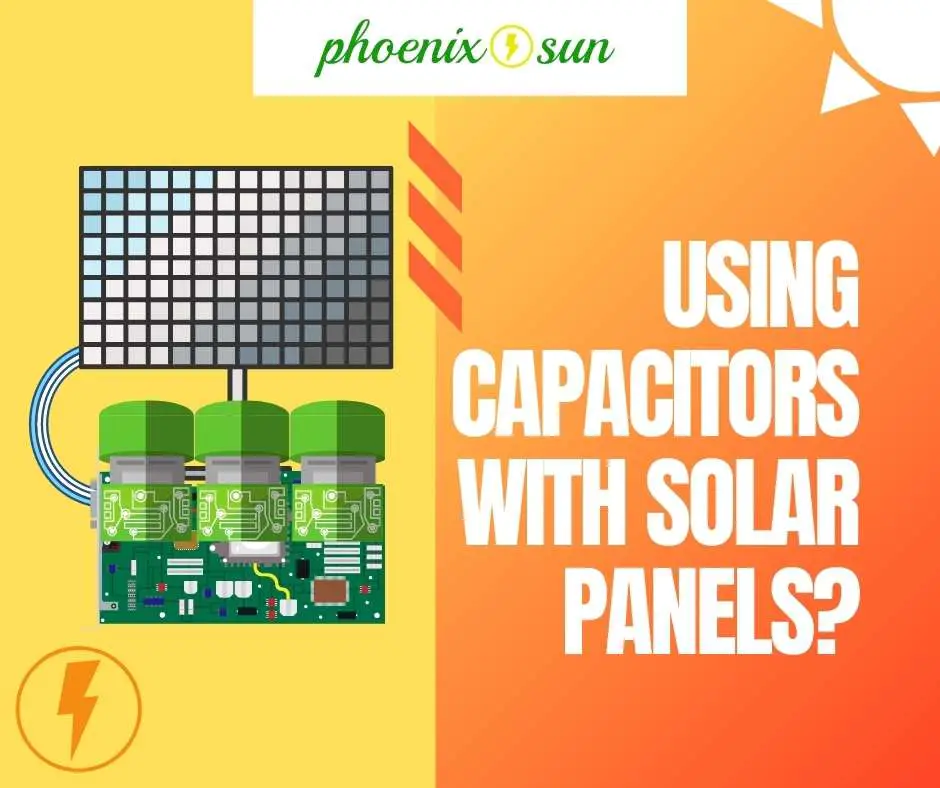Solar panels are now used for all everyday needs, and high efficiency is required to run the expected operations. The increasing demand creates the opportunity to increase production and enables solar energy storage for further use.
Using capacitors with solar panels steadily changes the performance and longevity of the solar system. Solar panels produce energy from the sun, and the system converts DC to AC electricity.
These all functions depend on capacitors, and it is a common scenario of using capacitors in a solar system.
In this article, we will reveal the answer to whether you can use a capacitor with solar panels or not.
Besides, we discuss supercapacitors for solar energy and the advantages and disadvantages of using capacitors with solar panels.
Contents
Can I use capacitors with solar panels?

Yes, you can use capacitors with solar panels. But, only the supercapacitors are eligible to perform with solar panels. The supercapacitors can discharge the high-voltage current from the solar cells, which is much higher than the loading current. It will help the system when there is an intermittent load.
Solar power generation depends on the PV cells, and it is the most common type of solar energy production. The cells generate electricity by pulling electrons loosened by absorbed solar power.
This electron flow is captured by DC and produces electricity. You can get AC via a converter, and this converter will convert DC into AC. Film capacitors or electrolytes are used for output AC filtering within this inverter.
So, capacitors play a vital role in solar power generation and PV cells. Users can employ a PV inverter or capacitor to convert the power easily.
On the contrary, capacitors can increase the usability and probability of producing maximum power in an off-grid solar power system.
For example, a remote garage can be powered with an off-grid solar system, and a solar system with supercapacitors converts the DC power to AC.
You can use this converted power directly to run lights, fans, and other devices without a traditional electricity connection. Your inverter circuit will be more powerful with supercapacitors.
Supercapacitors for Solar Energy Storage

Supercapacitors are high-capacity capacitors with higher capacitance and lower voltage limits.
The solar system is one of the most efficient energy sources for remote places where the grid is unavailable.
In general, this system uses batteries as its main storage system. A conventional battery will serve you 3 to 5 years, and you have to replace the battery after this lifespan.
Similarly, a battery’s lifespan will degrade sooner if you run high voltage electric devices such as motors, electric vehicles, etc.
When the battery demands a high surge current in a short duration, it will be very harmful for the battery’s lifetime. The battery is a high-energy storage system but not suitable for high-power destiny.
Supercapacitors can be an excellent solution for this situation and are widely used in the solar energy sector. With the PV system, the supercapacitors work to improve the energy destiny from the battery.
This system is known as a hybrid energy storage system (HESS). If the battery and supercapacitors work together, it will bring better benefits to the system.
A set of batteries and supercapacitors will reduce the current stress on the batteries to increase the lifespan. It will also decrease the maintenance and operating costs of the system.
Supercapacitors store electricity by separating positive and negative charges instead of chemically storing them. The battery acts as a buffer and high power drain in a system where batteries are connected with supercapacitors. It will create fast charging, unlimited life cycle, high power destiny, etc.
So, supercapacitors will create a hybrid battery solution for your solar energy storage system.
The Pros and Cons of Using Capacitors with Solar Panels
There are several advantages and disadvantages of using supercapacitors with solar panels. Among them, we present the most significant pros and cons of supercapacitors here.
Pros
Supercapacitors will balance the energy storage with charge and discharge times. They will store roughly 1/4 of energy with a lithium-ion battery.
It will enhance the charging capacity and allow the system for fast charging. If you have a supercapacitor with a solar system, it will charge 1000x faster than a similar battery charge.
For example, some electric devices that come with supercapacitors can charge instantly. Similarly, electric cars and fossil fuel motors can complete charging quickly with supercapacitors.
Supercapacitors have a wide-ranging operating temperature to create effective temperature control.
With supercapacitors, you will get an expanded lifespan of the batteries in a solar system.
Cons
On the contrary, the fast charging system of supercapacitors can create some minor problems. Here are some disadvantages of supercapacitors.
The discharge rate of supercapacitors is higher than lithium-ion batteries. So, the self-discharge rate won’t allow you to store energy for a long-time. This self-discharge system will lose 10-20 percent of energy per day.
It comes with another disadvantage of gradual voltage loss. When batteries supply a constant voltage, the voltage output of capacitors denies linear charge systems.
However, supercapacitors are suitable to use for solar panels. We find more advantages than disadvantages of supercapacitors.
Wrapping Up
Finally, supercapacitors will increase batteries’ lifetime and reduce the battery drainage rate in a solar system.
You will get more power from the solar panels in an existing system if you combine batteries and supercapacitors.
The fast and instant charging system will increase the usability of the solar system. It will enable the system to produce more energy from renewable sources.
You can instantly charge your batteries with 1000x more speed than conventional battery charging. Besides, supercapacitors allow you to run high-voltage electric devices without damaging batteries.
So, you can use capacitors with solar panels and get the advantages of hybrid battery systems.

Hello, I’m here in the North Idaho panhandle and am very interested in using a hybrid super capacitor/battery setup to enjoy all the benefits as you describe. My wife and I bought our place which is powered by a conventional propane generator that keeps a bank of batteries charged; recently I added 4 more batteries to our 24v system to double the capacity (430ah vs 219 originally), and am planning to add solar panels in the spring. I would like, however to add super caps to help with the voltage sags and of course extend the life of the batteries as you describe in your article. If you could steer me towards some designs or products that I could use to accomplish this, I would greatly appreciate it.
Thanks,
Miles C. Mueller
I’m currently living in a 37ft 97 allegro motor home and I only have 2 small marine type solar panels, I’ve increased the wire guage to 14 but I’m still needing to have a charger/ maintainer attached to the batteries, I have two marine batteries plus a couple lawn tractor batteries that I use for other hobby stuff. How big of a capacitor bank would I need to get?
Hello, We are looking for Super Capacitors Power Storage System for Solar application and Projects ranging from 3 KW to 60 KW
Adding 23 capacitors to my solar system before the charge controller because we have higher voltage there
Or system uses six car batteries and 6 panels 12s,1 big panel 24.
For years only had 1 85 watt panel
Gave up on deep cycle batteries as they have poor warrenty
Deep cycle batteries is not a choice anymore for long run.